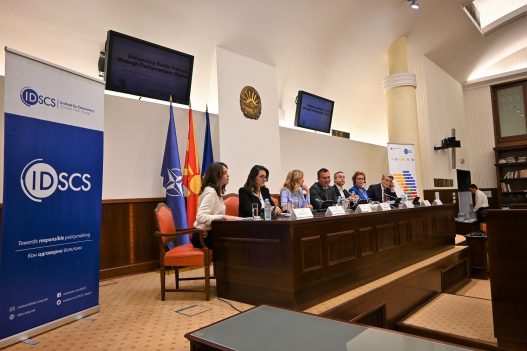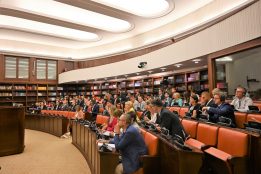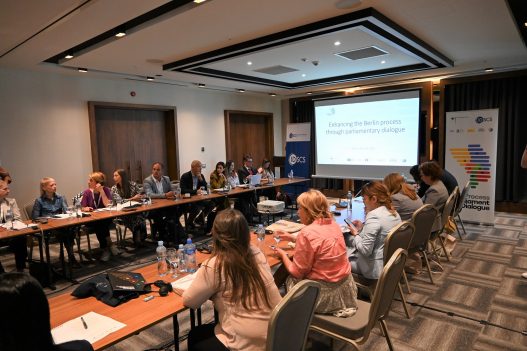On September 12 and 13, the Institute for Democracy hosted the regional event “Enhancing Berlin Process through Parliamentary Diplomacy” in which Members of Parliaments (MPs) and parliamentary staff from the Parliaments of the Western Balkans (WB), the German Bundestag and the European Parliament participated.
The purpose of the event is to bring the Berlin Process closer to the MPs and parliamentary staff and to initiate an interparliamentary and expert debate on the role of the parliaments of WB within the Berlin Process.
The event on the first day was opened by the President of the Assembly of the Republic of North Macedonia, Talat Xhaferi, the President of the Institute for Democracy, Marko Troshanovski, the Ambassador of the Federal Republic of Germany, Petra Drexler, and then the President of the Foreign Affairs Committee of the German Bundestag, Michael Roth, delivered his key remarks.
Troshanovski explained that the Berlin process includes cooperation between the Balkan countries that brings them closer to each other while also bringing them closer to the EU.
“Free roaming in the Balkans, recognition of diplomas or professional qualifications or traveling only with an ID card are benefits encouraged by the Berlin process, which are also benefits of EU membership. The process has many policies in addition to these (in the area of innovation, green agenda, digital transformation of our societies, etc.) and has financial resources. Governments undertake commitments whose implementation requires dedication and efficiency. With this project, we want to involve the parliaments to give their contribution to speeding up these commitments”, says Troshanovski.
We are aware that geographically, strategically and with the majority will of the citizens, as a region we are predisposed to become members of the European Union, as soon as we fulfill the necessary conditions for membership, says Xhaferi.
“We are also aware that along the way, all of us individually and collectively face many challenges of a different nature. Experientially, from the previous enlargements, we must accept that we have to deal with and find acceptable solutions to all the issues that are treated as open and present an obstacle on the way. By putting the most painful and complex issues on the agenda, Germany has shown a clear proactive role in helping and supporting the region and an unequivocal message that our societies need final reconciliation and real projects in the areas detected by the European Commission,” said Xhaferi.
According to Roth, Russia’s war in Ukraine has made it clear that stabilization of candidate countries is in everyone’s interest. He added that in order to achieve that, the accession process must be reformed so that the citizens of the candidate countries have benefits even before the accession itself.
“I assure you that sometimes as parliamentarians you have more influence than if you were part of the government. I want to emphasize that your future is also our common future. The accession of North Macedonia will be of symbolic importance for the entire region because it is a multi-ethnic example for the entire Western Balkans. A large part of the citizens of the region see their future in the EU regardless of all the disappointment they had with the EU, but I am not sure that they are patient to wait another 20 years. Citizens need immediate tangibility of the benefits of joining the EU, and in order to achieve this, a reform of the accession process is needed,” he added.
At the panel discussion dedicated to the role of parliaments in the Berlin process, the chairman of the Commission for European Affairs in the Macedonian Assembly, Arber Ademi, the chairman of the Commission for European Affairs in the Albanian Parliament, Jorida Tabaku, MP Robert Kozma, member of the Commission for European Affairs in the Serbian Parliament, MP Semsudin Mehmedović, member of the Committee for Transport and Communications in the Assembly of Bosnia and Herzegovina, Arbreše Kryeziu-Hyseni, the chairwoman of the Committee for Foreign Affairs in the Assembly of Kosovo and Zdenka Popović, member of the Committee for Economy, Finance and Budget of the Montenegrin Assembly.
The adviser for political processes related to the Berlin process in the Government of the Republic of North Macedonia, Marija Fileva, gave a short presentation on the achievements of the Republic of Macedonia in the Berlin process.
At the last panel of the first day “Lessons learned from the adoption of mobility agreements”, the keynote address was given by Manuel Sarrazin, Special Representative of the Government of the Federal Republic of Germany for the Western Balkans, and the panelists were Amer Kapetanović, Head of Political Department of the Regional Cooperation Council, Vancho Uzunov, Berlin Process Sherpa from Macedonia and Jeton Zulfaj, Berlin Process Sherpa from from Kosovo and Lulzum Rafuna, President of the WB6 CIF Management Board.
The second day of the event started with an address by Viola Von Cramon from the European Parliament who addressed via video message and David Oberhuber, the director of GIZ North Macedonia.
The first session “Knowledge transfer and consultation on Berlin process” was addressed by Amer Kapetanović, Head of Political Department of the Regional Cooperation Council and Milica Cvorović, an expert in coordination and communication at the CEFTA Secretariat. At the second session “Knowledge transfer and consultation on Common Regional Market and Green Agenda”, Maja Handjinska Trendafilova, Director of ReSPA (Regional School of Public Administration) and Jasmina Petkovska, member of the regional working group for the Green Agenda for the Western Balkans at Regional Cooperation Council.
This event is part of the “Parliamentary Diplomacy: Regional Cooperation through Enhanced Parliamentary Dialogue” project, which aims to promote the laws and benefits of the Berlin Process through the promotion of parliamentary diplomacy and the use of oversight mechanisms by the parliaments of the Western Balkans.
The project is implemented by six project partners in each of the six Western Balkans countries. The lead partner is the Institute for Democracy (IDSCS) – North Macedonia. The other project partners are Institute Alternativa (IA) – Montenegro, Institute for Political Studies (ISP) – Albania, CRTA – Center for Research, Transparency and Accountability – Serbia, Kosova Democratic Institute (KDI)– Kosovo, and the Network of Progressive Initiatives (NPI) – Bosnia and Herzegovina.






